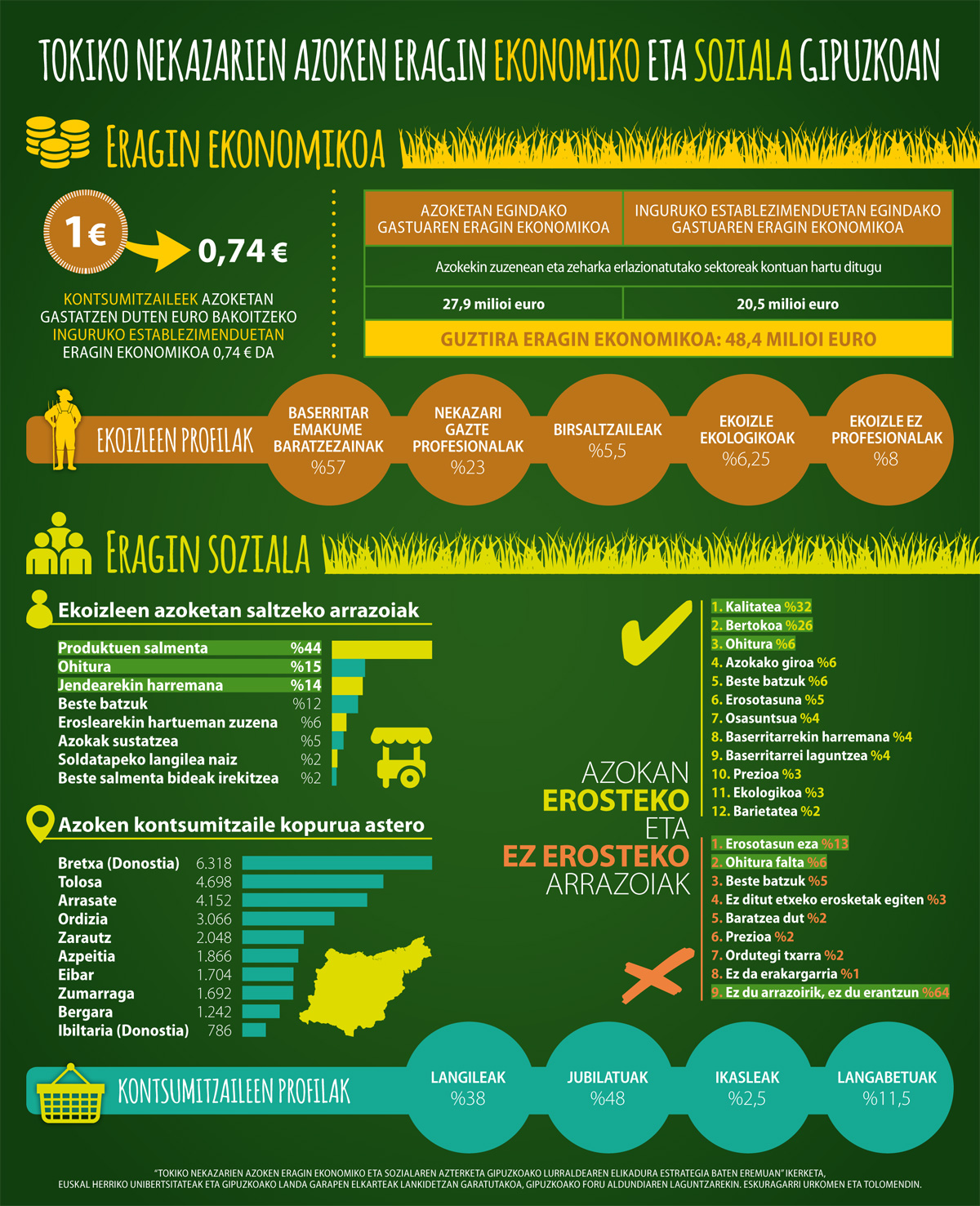
“Fairs are living spaces, important spaces that reflect the relationship with food in the village.” These are the words of PhD in Economics and professor at the UPV/EHU Mirene Begiristain. He is a member of the working group that has been analyzing the social and economic repercussions of the agricultural fairs of Gipuzkoa between 2015-2016, together with Eduardo Malagón and Aintzira Oñederra. The idea emerged from the reflection that the Rural Development Associations of Tolosa and Goierri began on the fairs, and the project has been launched by the Landaola Federation. Initially, it focused particularly on the economic point of view, and the working group considered it necessary to measure the social impacts on the approach to markets.
The research group has analyzed ten fairs in Gipuzkoa. Although each of them has its characteristics, small-scale diversified production is predominant among producers and profiles are similar: baserritarras women (56%), as well as consumers. “Women remain the face of food sovereignty and the same is true at trade fairs,” explains Begiristain. The working group has also attempted to incorporate the gender perspective in
the research n.En regarding profiles, another noteworthy fact is the low presence of young people at fairs: “Baserritarras are usually looking for other ways to sell their products, such as consumer groups or cooperatives. And, in short, it is the young baserritars who attract young consumers.” There is therefore something to be done in this regard.
The economic impact of the fairs, both
directly and in the establishments in the area, is important: The direct impact of expenditure is EUR 27.9 million, while the indirect impact is EUR 20.5 million. In total, the Basque Government calculates a movement of around EUR 48.4 million.
For this reason, Begiristain considers it important to focus on public policies: “There is no governance model for trade fair management. Fairs work because they have always worked, because they have inertia and tradition.” The reflection on management models and the development of strategies along with the baserritars are essential for the fairs to remain alive.
Duela lau urte abiatu zuten Azpeitian Enkarguk proiektua, Udalaren, Urkome Landa Garapen Elkartearen eta Azpeitiako eta Gipuzkoako merkatari txikien elkarteen artean. “Orain proiektua bigarren fasera eraman dugu, eta Azkoitian sortu dugu antzeko egitasmoa, bere izenarekin:... [+]
Donostiako Amara auzoko Izko ileapaindegi ekologikoak 40 urte bete berri ditu. Familia-enpresa txikia da, eta hasieratik izan zuten sortzaileek ile-apainketan erabiltzen ziren produktuekiko kezka. “Erabiltzaileen azalarentzat oso bortzitzak dira produktu gehienak, baina... [+]
Ubidekoak (Bizkaia) dira Imanol Iturriotz eta Aritz Bengoa gazteak. “Lagunak gara txikitatik, eta beti izan dugu buruan abeltzaintza proiektu bat martxan jartzeko ideia”, azaldu du Iturriotzek. Nekazaritzari lotutako ikasketak izan ez arren, baserri munduarekin eta... [+]
Iruñean bizi ziren Iñaki Zoko Lamarka eta Andoni Arizkuren Eseberri gazteak, baina familiaren herriarekin, Otsagabiarekin, lotura estua zuten biek betidanik. “Lehen, asteburuetan eta udan etortzen ginen eta duela urte batzuk bizitzera etorri ginen”, dio... [+]
Gipuzkoako hamaika txokotatik gerturatutako hamarka lagun elkartu ziren otsailaren 23an Amillubiko lehen auzo(p)lanera. Biolur elkarteak bultzatutako proiektu kolektiboa da Amillubi, agroekologian sakontzeko eta Gipuzkoako etorkizuneko elikadura erronkei heltzeko asmoz Zestoako... [+]
Emakume bakoitzaren errelatotik abiatuta, lurrari eta elikadurari buruzko jakituria kolektibizatu eta sukaldeko iruditegia irauli nahi ditu Ziminttere proiektuak, mahai baten bueltan, sukaldean bertan eta elikagaiak eskutan darabiltzaten bitartean.